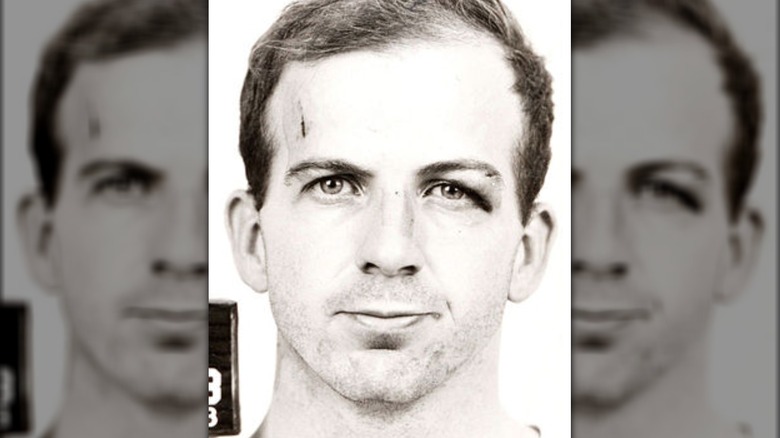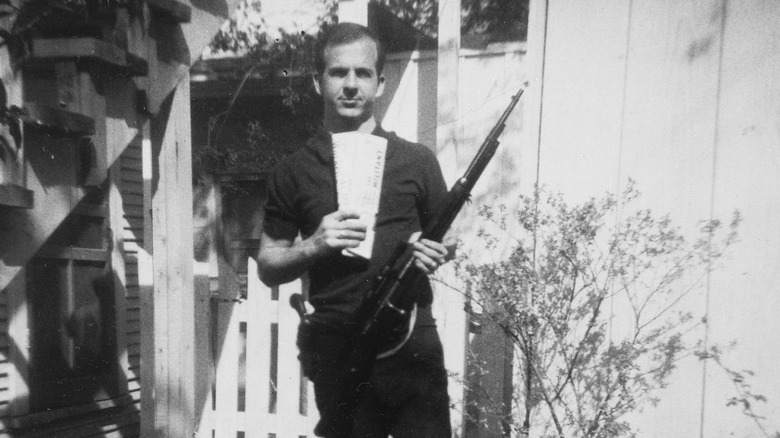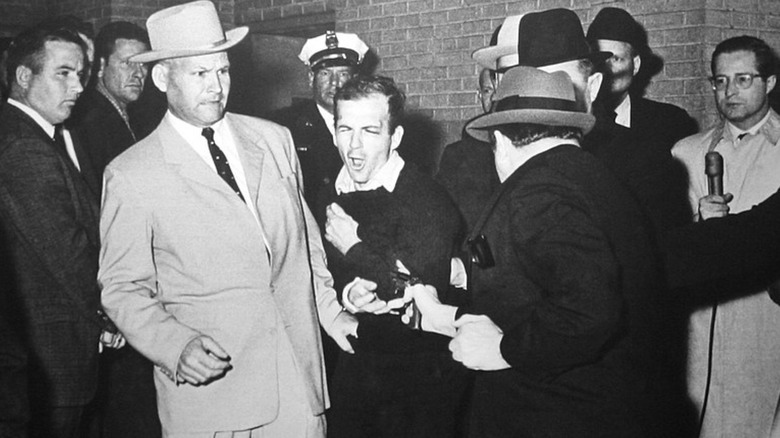JFK's Assassination Wasn't The Only One Lee Harvey Oswald Was Linked To
Today, Lee Harvey Oswald is primarily known for his assassination of United States President John F. Kennedy in Dallas, Texas on November 22, 1963. However, there's still considerable debate about whether Oswald acted alone or was a part of a larger conspiracy to kill the president, a debate that has continued to thrive due in no small part to Oliver Stone's 1991 film, "JFK." While we may never know the full story, Oswald's part in Kennedy's assassination only becomes more complicated when you look at his background.
According to Frontline, Oswald spent some time in Minsk, Russia in the early 1960s where he befriended several college students who were learning English at the time. Ernst Titovets was one of those students and became particularly close with Oswald. To help with his English, he would record Oswald reading excerpts from Shakespeare and Hemingway and even had him make up conversations on the spot. Eerily enough, one of those recordings featured Oswald pretending to be a serial killer describing someone he recently murdered. It would only be a few more years before Oswald would be charged with killing the leader of the free world, but it seems that murder was something that he'd been thinking about for some time before that fateful day in Dallas.
The attempted assassination of Edwin Walker
Kennedy wasn't the only person Oswald wanted to kill for political reasons; as revealed by Frontline, a full seven months before Oswald shot JFK, Oswald had actually attempted to assassinate the conservative Army General Edwin Walker when he fired a gun into his home. Oswald wasn't linked to the crime until after Kennedy's death when the bullet that was fired into Walker's home was connected to Oswald's ammunition. It seems that Oswald had been planning the murder for quite a while, collecting information on Walker's residence, where to store his rifle, and the political motives for the attack which he likened to stopping the rise of Adolf Hitler.
According to History, even though Oswald didn't achieve his goal of killing Walker, there's some speculation that he wanted to finish the job. In fact, right after killing Kennedy, some believe that he was headed directly to the home of Walker to assassinate him with the same rifle that he used to assassinate Kennedy. There doesn't seem to be enough evidence to support this idea (that we know of), but who knows for sure what other heinous acts Oswald was willing to commit once killing the president was checked off his list.
Lee Harvey Oswald's own assassination
Lee Harvey Oswald would ultimately become the victim of an assassination himself, just two days after he shot JFK, as chronicled in History. In an ironic twist of fate, the morning that Oswald was killed, he believed that no one would make an attempt on his life, at least that's what James Leavelle, a Dallas police officer who helped escort Oswald from his cell before he was shot, stated.
Leavelle told Frontline, "I put the handcuffs on him, and in the process of doing that, I more in jest kind of said, 'Lee, if anybody shoots at you, I hope they're as good a shot as you are,' meaning, of course, that they'd hit him and not me. And he kind of laughed and he said, 'Oh, you're being melodramatic,' or something to that effect. 'Nobody's going to shoot at me.'"
Oswald was ultimately killed later that day by Jack Ruby, who burst out of the crowd watching Oswald being escorted out of the jail and shot him in the abdomen with a .38-caliber Colt Cobra revolver. While Ruby has stated that he acted out of extreme grief and that the murder wasn't planned, it's been speculated that he killed Oswald to prevent him from revealing the larger conspiracy that was supposedly working against Kennedy. Like so many other aspects of the Kennedy assassination, we may never know the full truth.


